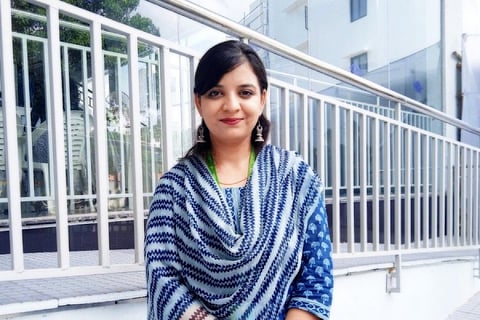

Even though it is a story that has become so familiar, so unforgettable, the visuals and words captured by filmmaker Nausheen Khan made Shaheen Bagh and the attack of students at the nearby Jamia Milia a painful recollection. She was a former student visiting the campus when the dreadful attacks happened in early 2020, in the months before COVID-19 when protests had broken out all over the country against the controversial Citizenship Amendment Act (CAA). After a few peaceful protests by students of Jamia, the police had unexpectedly barged into the campus, and shocking visuals of them wielding lathis on young people sitting in a library spread through the internet. When the attacks continued and students were brutally injured, a large number of women – mothers of the students – pained by what befell their children, began a protest at Shaheen Bagh, which would mark a historic moment that the world took note of.
Nausheen put together all the visuals and stories she collected and made the documentary Land of My Dreams. After its screening at the International Documentary and Short Film Festival of Kerala (IDSFFK) on Saturday, August 5, many delegates came to tell her how much it touched them, how moved to tears they were. "Within the first day (of the police attack), when there was teargas shelling on students, I knew that I had to make something on it. And more than that, more than the making of the film, I was very convinced that I have to archive and document every single moment of this thing," she tells TNM.
She was, she says, certain that none of this should be forgotten. "It should not be erased in any way. People should not say that this never happened, because that's happened so many times in our history, in the history of the world. Because history is written by winners. And people who don't come first are often forgotten," Nausheen says.
Bilkis Banu, one of the protestors at Shaheen Bagh / Land of my Dreams
In her narrative, she lets her own story seep into the picture. She was reluctant to do that initially, she says, but realised that the audience would be able to relate to Shaheen Bagh through her. "And I would become the bridge ... when people relate to me, then maybe they will also relate to Shaheen Bagh. Because some of my friends have never experienced any kind of political or social oppression because they are quite privileged," Nausheen says.
It seems apt that the teller cannot be so far removed from the story, which even to someone sitting far away in Kerala felt so close to heart. These women in front of her camera did not speak from a script. They were just there to protect their children and their families, unable to believe that anyone could say they did not belong in this country. They speak knowledgeably about the history of their land, of the CAA that threatened to drive many of them away. When one of them simply asks how someone can ask them to go away from their motherland, it is not for sympathy, but out of hurt. And what is on their faces, on their minds, is so contagious that so many from around the country sprang up in support.
Still from Land of my Dreams
"I feel like all of the mothers who were there at the protest side, they were also there on our behalf – yours and mine and all of the other people. They are also our mothers in a way because they are there out of love for us. So it doesn't matter if it's my mother or somebody else's mother at the end of the day, as long as those people did what they did, said what they said and that's why I kept going back there, because I felt like they're also my mother," Nausheen says.
In a voiceover in the documentary, she describes herself as a girl who grew up trying to fit in with the others and distancing herself from her religious identity. There is a very telling narration when she shows people in the gully and says (in the voiceover) that whatever else she did to cover her religion, they would come for her because of her very Muslim name. She realised she did not want to try and fit in anymore, and that she did not have to be apologetic for being a Muslim in the protest. "I felt like people were alleging that I'm attending the protest only because I'm Muslim. I realised that, yeah, so what? Is that a bad thing? Is that a wrong thing? When I realised that and I came face to face with my real self and was no longer feeling apologetic for who I am," she says.